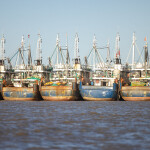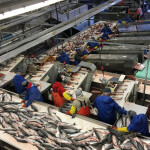The Marine Stewardship Council (MSC) has suspended the certifications of two sardine fisheries in Europe as a result of updated scientific advice that called for a reduction in fishing effort.
The MSC took action on the South of Brittany purse seine sardine fishery in France and the Spanish Bay of Biscay purse seine sardine fishery following updated scientific report from the International Council for the Exploration of the Seas (ICES) published in July 2018. The report “revised the understanding of the sustainability of the sardine stock and consequently advised a reduction in fishing effort,” MSC said in a press release.
Bureau Veritas, the conformity assessment body overseeing both fisheries, carried out an expedited audit for the French fishery and a full annual surveillance for the Spanish fishery, and concluded a re-scoring against the MSC standard would trigger the suspension of the MSC certification of both fisheries.
The suspension of both fisheries begins on 12 March, 2019. Those involved in the fisheries have 90 days from the notice of suspension, issued on the 11 February, to prepare a corrective action plan, according to MSC.
"This news is extremely disappointing for the French and Spanish sardine fishers who have worked hard together over the years to manage their fishing effort and their fisheries sustainability,” MSC Deputy Director for South Europe Edouard le Bart said. “This new scientific advice changes the game, but the efforts the fisheries have made so far are not in vain. On the contrary, the sardine stock remains healthy, and I strongly encourage fisheries to continue efforts to adapt to these new circumstances and, I hope, to recover their certification in the future.”
The Bay of Biscay sardine stock remains healthy, but fishing effort is now considered to be significantly above what is consistent with achieving maximum sustainable yield, MSC said in its release.
“This can pose a risk to low trophic level and short-lived species, such as sardine, because they can experience large fluctuations in stock size over very short timeframes. As a result, the current fishing effort is now thought to be too high,” the organization said.
The suspension will remain in place until the action plan brings the fishery back in line with the MSC standard – specifically, both fisheries must demonstrate that management mechanisms are in place “to ensure that catches on this stock are in line with the new ICES scientific advice,” according to MSC. The certifications must be withdrawn I such a plan is not submitted within the 90-day limit – in this case, 11 May, 2019.
“We have been working together with the French fishing sector and the scientist of IFREMER and AZTI over the last two years with the aim of improving the management of the fishery and to agree upon a strong harvest control rule, which guarantees the sustainability of the fishery in the long term,” Miren Garmendia, General Secretary of the Federation of Fishing Guilds of Guipuzcoa, said. “Although this work has not been enough to avoid the suspension of the fishery, we maintain a firmly commitment to continue this work, together with the science community and all stakeholders, for the adoption of a robust management plan.”
The French South of Brittany purse seine sardine fishery was first certified in 2009 and was recertified in January 2017. The Spanish Bay of Biscay purse seine sardine fishery was first certified in January 2017.






